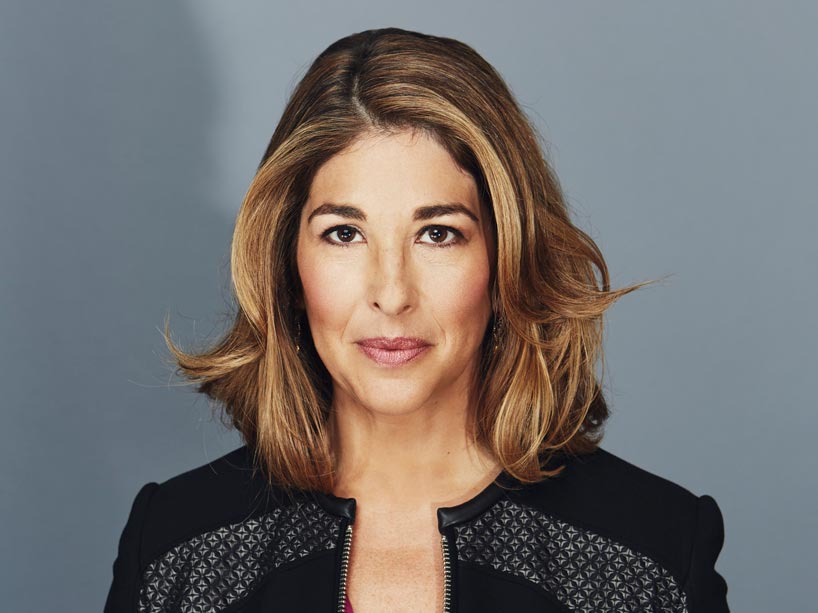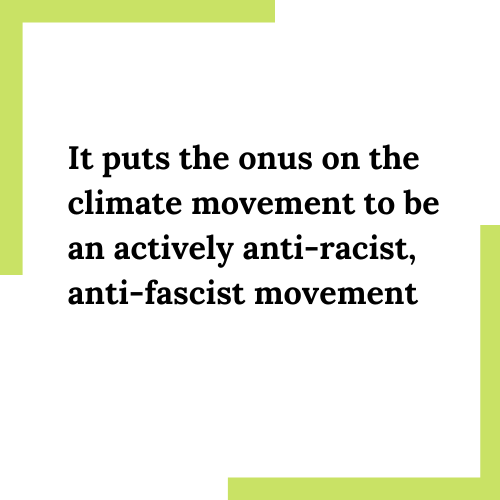
Climate justice requires acting “catalytically” and simultaneously on multiple social and economic fronts that challenge the ways of extractive capitalism, journalist and author Naomi Klein said during her Sept. 27 Ryerson Alumni Week keynote.
According to Klein, this includes actions rooted in Indigenous land back movements, Black liberation and migrant rights movements. It also includes disinvestment in policing, surveillance, incarceration and warfare.
She says these actions must be accompanied by massive investments in green social housing, union jobs, the care economy, public transit, weatherization, community-controlled renewable energy and international financing, “which means the global North paying our climate debts to the global South.”
“In other words, it means a Green New Deal for all,” said Klein.
On Sept. 27, Klein spoke about the state of overlapping emergencies of the climate crisis and the political pressure needed to make significant strides towards climate justice in her keynote, “This Changes Everything: Capitalism vs. the Climate.”
Klein is known for her climate activism, critiques of capitalism and corporate globalization and is currently working at University of British Columbia as a climate justice professor in the geography department.
She has written seven books, including her most recent book, On Fire: The (Burning) Case for a Green New Deal, a collection of essays focusing on the urgency of the climate crisis and the rising political movement demanding a Green New Deal.
Speaking from land of the Tla-o-qui-aht First Nations in Tofino, B.C., Klein called attention to the record-breaking heat wave in the province that killed almost 600 people and cooked more than a billion seashore creatures to death.
Klein emphasized the compounding of environmental and social tragedies that happened this summer just in British Columbia, including the discovery of 215 unmarked children’s graves on the site of a former Kamloops residential school, the wildfires that raged through the province’s interior and the devastating impact of COVID-19 on long-term care homes.
“Which begs the question, how many alarms need to go off at once, in our collective house before we say, ‘We need to devote all of our collective energy to putting the fires out instead of obsessing about how we can get back to that crisis known as normal?’” she said.
Climate action in the election
Klein mentioned that meaningful climate action “challenges capitalist logic” as it requires expansion in the non-market economy, keeping “profitable” carbon in the ground and reducing wasteful consumption patterns that grow GDP, such as pipelines.
“This makes it very difficult politically, but I want to tell you that I believe our hand here in Canada in making these kinds of transformation demands is quite strong,” she said, citing the recent federal election.
The Liberal party, the New Democratic Party (NDP) and Green Party all put their respective climate action plans front and centre of their campaigns, according to Klein.
With the latest numbers showing the Liberals receiving 32.6 per cent of the vote, NDP receiving 17.8 per cent and the Greens receiving 2.3 per cent, she said that when you add these numbers up – totalling 53 per cent – it shows that a clear majority of the electorate favour a party with some sort of bold climate action plan.

Klein said that we are in a “malleable moment” in part due to these election results. Minority governments, like the one the Liberal party has just secured, are open to pressure and even more so now, given the blowback from the “unnecessary election.”
“They just got an earful from voters about how angry they were about unnecessary elections being called in the middle of emergencies,” she explained. “Which means that there is this very strong incentive for them to co-operate with those other parties.”
Klein said because of this political climate, there’s a real chance to demand those that ran on “progressive electoral platforms” work together to deliver a stable government, based on a simple premise that the “pandemic recovery must be a Green New Deal for all.”
“While the election results are still top of mind and while meaning is still malleable, I think that that is a message that they very clearly need to hear.”
The intersection of inequality and climate change
Klein says that there’s always a risk of crises like COVID-19 being used to advance “pre-existing wish lists of policies” held by right-wing groups that favour deregulation and privatization.
She used the examples of former U.S. president Donald Trump using the pandemic as cover for environment deregulation, the current violence against Haitian migrants at the U.S. border being justified as a COVID health measure and Alberta Premier Jason Kenney’s passing of health-care privatization policies during the pandemic.
Klein has written extensively about how environmental and health catastrophes like those have historically been exploited to push deregulation and privatization, which further intensifies inequalities.
“The single greatest determinant to vulnerability to disasters is income and the poorer you are, the less able you are to protect yourself and the less able you are able to rebuild,” Klein said.

She explained that poverty and racism are major factors in increased vulnerability to climate disasters and chances are, disasters will make marginalized communities even more vulnerable and poor.
“The extreme levels of inequality that our society has is acting as a kind of a moral hazard to keep us from acting like our houses are on fire, because the rich don’t believe their houses are on fire – what they believe is that if one house burns, they’ve got another house.”
Klein also spoke about how dangerous theories of racial hierarchy, like white supremacy, emerge as rationales against climate migrants and vaccine hoarding.
“There’s that brutal hierarchy of humanity that says, ‘Well, let them drown.’ That’s essentially Europe’s migration policy, blaming the victims,” she said.
She also mentioned the “incredibly violent language” being used to rationalize the anti-vaccine movement, which she said can be understood as this “willingness to just let people die” because they’re perceived as “less deserving.”
“If you tune in to some of the anti-vax discourse in the ‘wellness’ community, it is kind of bio-fascist,” Klein explained. “It’s like, ‘I take care of my body, I have a strong immune system. It’s not my fault if you don’t, why should I have to take this vaccine?’”
With fascism and racism surging globally, she said the climate movement cannot take a neutral position to this.
“It puts the onus on the climate movement to be an actively anti-racist, anti-fascist movement.”
Kayla Zhu was a news editor/data reporter for On The Record in the Fall 2021 semester. Previously, she has worked as a reporter for J-Source, online editor for The Eyeopener and managing editor for Folio Magazine.
